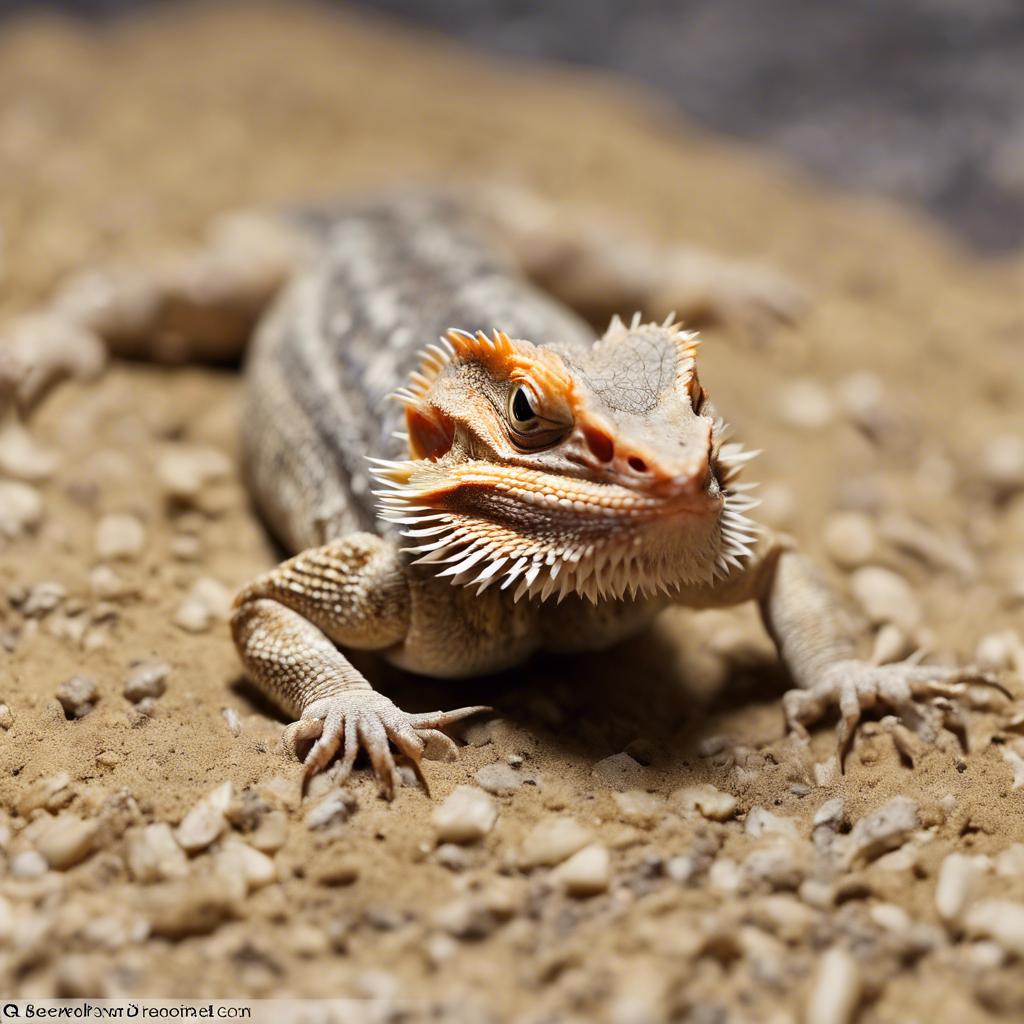Dubia roaches are a popular choice of food for bearded dragons due to their nutritional value and ease of care. Bearded dragons are omnivorous reptiles that require a balanced diet of both insects and vegetables. Dubia roaches provide a high protein content and are rich in essential nutrients, making them an excellent food source for bearded dragons.
Bearded dragons are native to Australia and are known for their unique appearance, with spiky scales and a beard-like flap of skin under their chin. They are popular pets due to their docile nature and relatively low maintenance requirements. In the wild, bearded dragons primarily feed on insects, vegetation, and occasionally small vertebrates.
Key Takeaways
- Dubia roaches are a popular food source for bearded dragons.
- Dubia roaches are highly nutritious and provide a balanced diet for bearded dragons.
- Feeding dubia roaches to bearded dragons can improve their overall health and well-being.
- Proper care and feeding of dubia roaches is essential to prevent potential health issues in bearded dragons.
- Alternatives to dubia roaches are available for bearded dragon food, but they may not provide the same nutritional value.
Nutritional Value of Dubia Roaches for Bearded Dragons
Dubia roaches are highly nutritious and provide a well-rounded diet for bearded dragons. They are low in fat and high in protein, which is essential for the growth and development of these reptiles. In addition to protein, Dubia roaches also contain vitamins, minerals, and amino acids that are necessary for maintaining overall health.
Compared to other common bearded dragon foods such as crickets or mealworms, Dubia roaches have a higher protein content. They also have a favorable calcium to phosphorus ratio, which is crucial for proper bone development in bearded dragons. This makes them an ideal food choice for young bearded dragons who require more protein and calcium for growth.
Benefits of Feeding Dubia Roaches to Bearded Dragons
Feeding Dubia roaches to bearded dragons can have several benefits for their growth, health, and overall well-being. The high protein content in Dubia roaches promotes muscle development and helps bearded dragons reach their full size potential. It also aids in shedding, as the protein supports healthy skin regeneration.
In addition to promoting growth, Dubia roaches provide essential nutrients that contribute to the overall health of bearded dragons. The vitamins and minerals found in these roaches help support a strong immune system, improve digestion, and enhance organ function. This can lead to a longer lifespan and a healthier, more active bearded dragon.
Another significant benefit of feeding Dubia roaches to bearded dragons is the reduced risk of impaction. Impaction occurs when a bearded dragon ingests a foreign object or food that cannot be properly digested. Dubia roaches have a soft exoskeleton, making them easier to digest compared to other insects with harder shells. This reduces the likelihood of impaction and digestive issues in bearded dragons.
How to Properly Care for Dubia Roaches as Bearded Dragon Food
Proper care of Dubia roaches is essential to ensure their nutritional value and prevent any potential health issues for bearded dragons. Here are some guidelines for caring for Dubia roaches as bearded dragon food:
Housing requirements: Dubia roaches should be kept in a well-ventilated container with enough space for them to move around. The container should have smooth sides to prevent escape. It is important to provide hiding spots and egg cartons for the roaches to climb on.
Feeding and watering needs: Dubia roaches require a balanced diet to maintain their nutritional value. They can be fed a combination of fresh fruits, vegetables, and commercial roach chow. It is important to provide a water source such as a water gel or fresh fruits and vegetables with high water content.
Temperature and humidity control: Dubia roaches thrive in temperatures between 80-95°F (27-35°C) with a humidity level of 40-60%. It is important to monitor and maintain these conditions to ensure the health and longevity of the roaches.
How to Properly Feed Dubia Roaches to Bearded Dragons
Feeding Dubia roaches to bearded dragons requires careful consideration of frequency, amount, and preparation. Here are some guidelines for properly feeding Dubia roaches to bearded dragons:
Frequency and amount of feeding: Bearded dragons should be fed Dubia roaches 2-3 times a week, depending on their age and size. The number of roaches fed per meal should be based on the size of the dragon. A general rule of thumb is to feed them as many roaches as they can consume in 10-15 minutes.
Preparing Dubia roaches for feeding: Before feeding Dubia roaches to bearded dragons, it is important to gut-load them with nutritious food. This involves feeding the roaches a diet rich in fruits, vegetables, and commercial roach chow for at least 24 hours before offering them to the dragon. This ensures that the roaches are packed with essential nutrients.
Monitoring bearded dragon's appetite and health: It is important to monitor the bearded dragon's appetite and overall health when feeding Dubia roaches. If the dragon is not showing interest in eating or is experiencing any digestive issues, it may be necessary to adjust the feeding schedule or seek veterinary care.
Potential Health Issues with Feeding Dubia Roaches to Bearded Dragons

While feeding Dubia roaches to bearded dragons can have numerous benefits, there are also potential health issues that need to be considered. These include bacterial infections, allergic reactions, and parasite transmission.
Risk of bacterial infections: Dubia roaches can carry bacteria such as Salmonella, which can be harmful to both bearded dragons and humans. It is important to practice proper hygiene when handling Dubia roaches and thoroughly wash hands after contact.
Allergic reactions: Some bearded dragons may develop allergic reactions to certain foods, including Dubia roaches. Symptoms of an allergic reaction can include swelling, itching, and difficulty breathing. If any of these symptoms occur, it is important to seek veterinary care immediately.
Parasite transmission: Dubia roaches can potentially carry parasites that can be transmitted to bearded dragons. It is important to source Dubia roaches from reputable breeders and ensure that they are properly cared for and free from parasites.
Signs of Allergic Reactions to Dubia Roaches in Bearded Dragons
It is important to be aware of the signs of allergic reactions in bearded dragons when feeding them Dubia roaches. Some common symptoms to look out for include:
– Swelling or redness around the mouth or face
– Itching or scratching
– Difficulty breathing or wheezing
– Lethargy or decreased activity levels
– Changes in appetite or refusal to eat
If any of these symptoms occur after feeding Dubia roaches to a bearded dragon, it is important to seek veterinary care immediately. Allergic reactions can be serious and require prompt medical attention.
How to Prevent Health Issues When Feeding Dubia Roaches to Bearded Dragons
To prevent health issues when feeding Dubia roaches to bearded dragons, it is important to follow proper hygiene and sanitation practices, schedule regular veterinary check-ups, and avoid overfeeding.
Proper hygiene and sanitation practices: When handling Dubia roaches, it is important to wash hands thoroughly before and after contact. It is also recommended to use separate utensils and containers for feeding Dubia roaches to prevent cross-contamination with other foods.
Regular veterinary check-ups: Regular veterinary check-ups are essential for monitoring the health of bearded dragons and addressing any potential issues early on. A veterinarian can provide guidance on proper nutrition, feeding schedules, and overall care for bearded dragons.
Avoiding overfeeding: Overfeeding can lead to obesity and other health issues in bearded dragons. It is important to follow the recommended feeding guidelines and monitor the dragon's weight and body condition regularly.
Alternatives to Dubia Roaches for Bearded Dragon Food
While Dubia roaches are a popular choice for bearded dragon food, there are also other options available. Some alternatives to Dubia roaches for bearded dragon food include:
Other insect options: Crickets, mealworms, superworms, and phoenix worms are all suitable insect options for bearded dragons. Each insect has its own nutritional profile, so it is important to provide a varied diet to ensure a balanced intake of nutrients.
Vegetables and fruits: Bearded dragons also require a variety of vegetables and fruits in their diet. Leafy greens such as kale, collard greens, and dandelion greens are excellent choices. Fruits such as berries, melons, and apples can be offered as occasional treats.
The Benefits and Risks of Feeding Dubia Roaches to Bearded Dragons
In conclusion, feeding Dubia roaches to bearded dragons can provide numerous benefits for their growth, health, and overall well-being. The high protein content and essential nutrients found in Dubia roaches support muscle development, immune function, and organ health in bearded dragons. They also have a soft exoskeleton, reducing the risk of impaction.
However, it is important to be aware of the potential health issues associated with feeding Dubia roaches to bearded dragons. These include bacterial infections, allergic reactions, and parasite transmission. By practicing proper hygiene and sanitation, scheduling regular veterinary check-ups, and avoiding overfeeding, these risks can be minimized.
Ultimately, the key to a healthy and happy bearded dragon lies in providing a balanced diet that includes a variety of insects, vegetables, and fruits. By carefully monitoring their appetite and overall health, bearded dragon owners can ensure that their pets thrive and live a long, fulfilling life.
If you're wondering whether dubia roaches are good for bearded dragons, you'll definitely want to check out this informative article on Reptile Wizard. They provide valuable insights into the benefits of feeding dubia roaches to your bearded dragon and how it can contribute to their overall health and well-being. To learn more about this topic, click here: https://reptilewizard.com/dubia-roaches-good-for-bearded-dragons/.
FAQs
What are dubia roaches?
Dubia roaches are a species of cockroach that are commonly used as feeders for reptiles and other exotic pets. They are also known as orange-spotted roaches or Guyana roaches.
Are dubia roaches good for bearded dragons?
Yes, dubia roaches are a great source of nutrition for bearded dragons. They are high in protein and low in fat, making them a healthy and balanced food option.
What are the benefits of feeding bearded dragons dubia roaches?
Dubia roaches are a great source of protein, which is essential for the growth and development of bearded dragons. They are also low in fat and high in moisture, which helps to keep bearded dragons hydrated.
How often should bearded dragons be fed dubia roaches?
Bearded dragons should be fed dubia roaches as part of a balanced diet. The frequency of feeding will depend on the age and size of the bearded dragon, but generally, they can be fed 2-3 times per week.
Are there any risks associated with feeding bearded dragons dubia roaches?
Dubia roaches are generally considered safe to feed to bearded dragons. However, it is important to ensure that the roaches are properly gut-loaded and free from any pesticides or other harmful substances. Overfeeding can also lead to obesity and other health issues.

